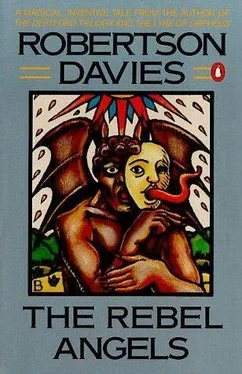Robertson Davies - The Rebel Angels
Здесь есть возможность читать онлайн «Robertson Davies - The Rebel Angels» весь текст электронной книги совершенно бесплатно (целиком полную версию без сокращений). В некоторых случаях можно слушать аудио, скачать через торрент в формате fb2 и присутствует краткое содержание. Жанр: Триллер, на английском языке. Описание произведения, (предисловие) а так же отзывы посетителей доступны на портале библиотеки ЛибКат.
- Название:The Rebel Angels
- Автор:
- Жанр:
- Год:неизвестен
- ISBN:нет данных
- Рейтинг книги:5 / 5. Голосов: 1
-
Избранное:Добавить в избранное
- Отзывы:
-
Ваша оценка:
- 100
- 1
- 2
- 3
- 4
- 5
The Rebel Angels: краткое содержание, описание и аннотация
Предлагаем к чтению аннотацию, описание, краткое содержание или предисловие (зависит от того, что написал сам автор книги «The Rebel Angels»). Если вы не нашли необходимую информацию о книге — напишите в комментариях, мы постараемся отыскать её.
The Rebel Angels — читать онлайн бесплатно полную книгу (весь текст) целиком
Ниже представлен текст книги, разбитый по страницам. Система сохранения места последней прочитанной страницы, позволяет с удобством читать онлайн бесплатно книгу «The Rebel Angels», без необходимости каждый раз заново искать на чём Вы остановились. Поставьте закладку, и сможете в любой момент перейти на страницу, на которой закончили чтение.
Интервал:
Закладка:
Late November can be a romantic time of year in Canada; the bare trees, the frosty air and whirling winds, the eerie light which sometimes persists for the whole of the day and then sinks, shortly after four, into steely darkness, dispose me to Gothic thoughts. In Spook, so Gothic in architecture, it was tempting to indulge northern fantasies, and I found myself wondering if in such a frame of mind I was not working under the eye of Doctor Faustus himself, for Hollier had the intensity of Faust and much of his questing appearance. But then, no Faust without Mephistopheles, and there was Parlabane, as slippery-tongued, as entertaining, and sometimes as frightening as the Devil himself. Of course in Goethe's play the Devil appears handsomely dressed as a travelling scholar; Parlabane was at the other end of the scale, but in his command of any conversation he had with me, and his ability under all circumstances to make the worse seem the better thing, he was acceptable as Mephistopheles.
I have no use for a woman who doesn't want to try conclusions with the Devil at some time in her life. I am no village simpleton, like poor Gretchen whom the Devil delivered over to Faust, for his pleasure; I am my own woman and even if I gained what I desired, and Hollier declared his love for me and suggested marriage or an affair, I would not expect to be subsumed in him. I know this is a bold word, for better women than I have been devoured by love, but I would hope to keep something of myself for myself, even if only to have one more thing in my power to give. In love I do not want to play the old, submissive game, nor have I any use for the ultra-modern maybe-I-will-and-maybe-I-won't-and-anyhow-you-watch-your-step game; Tadeusz's daughter and a girl part Gypsy had no time for such thin, sour finagling. Parlabane was trying to seduce me intellectually, to put me with my back on the floor and leave me gasping and rumpled, and all with words. I decided to see what luck I would have in discombobulating him.
"Brother John," I said one November afternoon when the light in Hollier's outer room was beginning to fade, "I'm going to give you a cup of tea, and a question to answer. You have been telling me about the world of philosophical scepticism, and God as the only escape from a world blighted by tragic ambiguity. But I spend my time working with the writings of men who thought otherwise, and I find them strongly persuasive. I mean Cornelius Agrippa, Paracelsus, and my own dear François Rabelais."
"Spleeny Lutherans, every one of them," said Parlabane.
"Heretics, probably, but not Lutherans," I said. "How could such soaring spirits agree with the man who declared that society is a prison filled with sinners, in which order has to be maintained by force? You see, I know something of Luther, too. But don't try to sidetrack me with Luther. I want to talk about Rabelais, who said that a free human creature finds his rule of conduct in his sense of honour -"
"Just a minute; he didn't say 'a free human creature', he said men – 'men that are free, well born, well-bred, and conversant in honest companies'."
"You don't have to give it to me in English; I know it in French – 'gens libres, bien nés, bien instruits, conversant en compagnies honnêtes' and if you can prove to me that "gens" means Men Only I should like to hear you do it. It means "people". You have the common idea of Rabelais as a woman-hater, because you have only read that gassy translation by Sir Thomas Urquhart -"
"As a matter of fact I have been rereading it because Urquhart McVarish has lent me a copy -"
"I'll lend you a French copy, and in it you'll discover that where Rabelais sets out the plan for his ideal community – one might almost call it a university – he includes lots of women."
"For entertainment, one assumes."
"Don't assume. Read – and in French."
"Molly, what a horrible old academic scissorbill you are getting to be."
"Abuse cannot shake me. Now answer my question: isn't a sense of honour a sufficient rule of conduct?"
"No."
"Why not?"
"Because it can be no bigger than the man – or woman, if you are going to be pernickety – who possesses it. And the honour of a fool, or a pygmy-in-spirit, or a redneck, or a High Tory, or a convinced democrat are all wholly different things and any one of them, under the right circumstances, could send you to the stake, or stop your wages, or just push you out into the cold. Honour is a matter of personal limitation. God is not."
"Well, I'd rather be François Rabelais than one of your frozen sceptics, grabbing at God as a lifebelt in an Arctic sea."
"All right; be anything you please. You are a romantic; Rabelais was a romantic. His nonsense suits your nonsense. If the lie of honour as a sole and sufficient guide to conduct suits you, well and good! You'll end up with those English idiots who used to govern their lives by what is or is not cricket."
"Come on, Parlabane, this is just hair-splitting and academic abuse. Don't you make any allowance for quality of life? Isn't the worth of what a man believes shown by what his belief makes of him? Wouldn't you rather live nobly as François Rabelais than be stuck in the deep freeze of scepticism, wondering when, and if, God is going to open the door of the fridge and thaw you out?"
"Rabelais didn't live nobly. Most of his life he was on the run from people who were more accurate reasoners than he was."
"He was a great writer, a broad and copious writer, a man of wide and hospitable mind."
"Romanticism. Sheer romanticism. You are putting forward critical opinions as if they were facts."
"O.K., you have beaten me at the academic game, but you haven't changed my mind, and so I don't admit that you've beaten me at the real game."
"Which is?"
"Well, look at you and look at me. I'm delighted with what I'm doing, and I've never heard you say one pleasant or approving thing about anything you've ever done, except for a single love-affair that turned out badly. So which of us is the winner?"
"You are a fool, Molly. A beautiful fool and you prattle your nonsense in such a lovely voice and with such an enchanting hint of a foreign accent that a young heterosexual like Arthur Cornish might take you for a genuine, solid-gold Aspasia."
"So I am, or at any rate so I may be. You keep telling me that I am a woman, but you haven't any idea what a woman is. Yours is a masculine mind, and I suppose it's a pretty good one, though it doesn't originate anything: my mind is feminine, and where yours delights in subtle distinctions it is all one colour, and my mind is in shades that shame the spectrum. I can't beat you at your game, but I don't think you can even guess what my game is."
"Prettily put, but might I suggest that at present your game is romanticism – oh, not in any dismissive sense, but meaning a rich diffusion, and profusion, and -"
"Go on. Confusion. But only if I let you make the rules."
"Please let me finish. I have told you that the crown of my tree is a scepticism that leaves nothing untouched but the wonder of God. But I have a root, to nourish my crown, and as usual the root is the contrary of the crown – the crown upside down, in the dark instead of in the light, working towards the depths instead of straining upward to the heights. And my root is romantic, Molly, and in the realm of romance you and I can meet and have the greatest sport together. Why do you think I am writing a novel? Sceptics don't write novels."
"Well, Brother John, from what I have learned about you I cannot imagine why you are writing a novel. You are talkative, but not I think imaginative; you are no romancer, no bard, no unfolder of marvels. I don't know any novelists, but you seem an unlikely candidate for that sort of job."
Читать дальшеИнтервал:
Закладка:
Похожие книги на «The Rebel Angels»
Представляем Вашему вниманию похожие книги на «The Rebel Angels» списком для выбора. Мы отобрали схожую по названию и смыслу литературу в надежде предоставить читателям больше вариантов отыскать новые, интересные, ещё непрочитанные произведения.
Обсуждение, отзывы о книге «The Rebel Angels» и просто собственные мнения читателей. Оставьте ваши комментарии, напишите, что Вы думаете о произведении, его смысле или главных героях. Укажите что конкретно понравилось, а что нет, и почему Вы так считаете.












